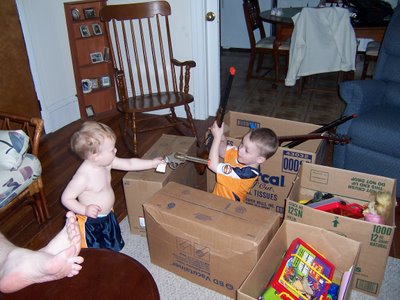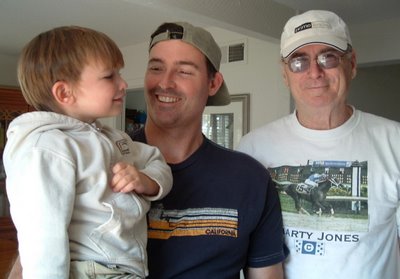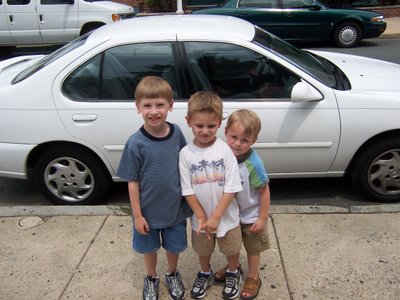Most of us are familiar with the famine that occurred in Ireland in the middle of the 19th century. And though our family did not come over to America during the years of the Great Famine , the famine affected the country to the extent that our Irish side began leaving during the years of its aftermath.
I know the Gallagher side of our family came over in 1880. They came from Donegal, a fishing community located in the NorthWestern part of Ireland known for its dangerous rugged high cliffs. The Bolands came to America between the years 1901 to 1908 (the eldest daughter Mary came over in 1901 with her husband followed by the others in 1908) from the Western part of Ireland County Mayo known for its vast fertile farmlands. I know the McCafferys had been here the longest because I was able to trace family all the way back to the late 1870's but exactly what part of Ireland they are from I do not know.
In 1845 the Irish survived by farming off of small sections of land they rented from their British Landlord. They planted the potato because it could be planted quickly in rows covered by dirt so they could have food for their families while working other jobs such as fishing in the Irish Sea or planting fields of grains, wheats and vegetables for the funds to pay their British Landlords. Most lived in one room cottages with dirt floors and a fire in the center which they used for heat and cooking. It was widely known that the poorest of English paupers were better fed and better dressed then the most prosperous of Irish laborers. When the famine hit in 1845, Ireland was one of most poverty stricken countries in the world.
And when the famine hit, the hardest struck counties were in the Western part of the country, Galway, Mayo, Sligo and Roscommon. As hunger spread across the counties, folks began to eat the rotted potatoes which caused the first major outbreak of disease, Dysentery. Those who were fortunate enough to have animals such as goats and cows, slaughtered the animals for food. Those near the coastal areas searched the beaches for small shelled snails that stuck to rocks. Some ate seaweed. Others ate the roots of weeds, flowers or seed left over that once fed their livestock.
Hunger began to take its toll as their bodies succumbed to weakness. Their weak bodies became a host for other diseases such as Xerophthalmia (eye ailment that caused blindness), Cholera, Typhus and Scurvy.
And when the Irish tenant farmers were too sick to plant new crops, they lost their small one room cottages because they could not pay the rent to their British Landlords. So they left their homes in search of anything eatable and they left their homes to find work. The ironic part of this whole thing is that as millions died in Ireland of starvation and the diseases that followed, the British Landowners in Ireland shipped tons of wheat, corn, oats, barley and rye to England. It is said that the tons of wheat alone could have fed the entire Irish population.
As millions died, the bodies needed to be buried and buried quickly to ward off the further spread of disease. Ireland became a vast grave yard of pits where bodies were buried in shallow graves with only a sheet wrapped around them. And all the while starving animals that roamed the countryside free fed on the dead corpses.
In 1847 the British government took steps to relieve some of the suffering occurring in Ireland by setting up soup kitchens. At least a starving peasant could get a quart of soup and a few slices of bread each day. But as a glimmer of hope began to shine in the daily lives of the Irish, horror stuck again as a second potato crop in 1847 failed and the coldest winter in Ireland's recorded history followed.
The country experienced its first mass exodus thousands of people in fear for their lives and the lives of their children began moving as a group to board ships that would take them to far distant lands where they may have the chance for survival. Between the years 1845 to 1851, more than one million people left Ireland. The greatest number of immigrants came to the United States.
In the 19th century, trips across the Atlantic Ocean were reserved for the spring and summer months because it was when the ocean and sky were at their calmest. But with so many of the Irish wanting to leave their homeland, ships began making the trip across the Atlantic in the other seasons of the year when the Ocean waters were high and rough and the sky not so calm. Most had no idea where they may end up but they did know for certain they were escaping death from starvation.
The cost to sail across the ocean was not cheap in those days so it was not uncommon for one member of the family to cross first, seek work, then send for the others. Seventeen dollars would buy you a space in the steerage and if you had seventy dollars you got a cabin.
Seventeen dollars got you a space in which you would live for the better part of a month among unwashed diseased infested bodies, rotting food, vomit and death. The trip became a virtual cesspool. The death rate for those crossing over the ocean was between 15 to 40 percent. Most died from cholera and typhus. Others suffered from seasickness and body lice. The year 1847 was recorded as the worst year for ship crossings as these ships inherited the name "coffin ships".
(Tomorrow Part II, Living in America)
Wednesday, May 31, 2006
Working Ahead
The next few weeks are going to be nothing short but insane for me so I have decided to write articles for my blog in advance but post them day by day as ususal. Hopefully, I can keep up with the pace but if I fall short of any postings, those of you who follow "A Journey Into The Past" and "Child Lost" will have a head's up.
This Friday I will be having surgery on my right shoulder which will make it difficult to write for a while. (Why can't I be left handed) I had an injury at work in February that refuses to heal with conservative treatment. Which really stinks because I have already made plans for a short Florida vacation June 30th to July 4th. And to really make this interesting, I have settlement on a new house July 5th. But thank God for family because they have already volunteered to pitch in and help. There is no way I will be carrying any boxes on moving day. I will be lucky if I will be able to reach my right arm over my head. That is something I have not been able to do very well in the last few months. Anyway, after endless months working in pain, (Living on advil and Licoderm pain patches) I will venture out and place myself under the knife. ( I must be crazy) But what choice do I have, I love my job and it requires a steady arm to draw blood from a patient. (I believe my patients would appreciate a steady arm)
Maybe when this surgery thing is all over and I am no longer screaming in pain and wishing death on anyone brave enough to come within five feet of me, I will share the graphic details my surgeon felt it necessary to share with me two weeks ago. (You know, that step by step manual of how to cut a shoulder open) I will never understand why every surgeon feels the need to explain in GREAT DETAIL what they intend to do to you while you are BLESSEDLY KNOCKED OUT.
This Friday I will be having surgery on my right shoulder which will make it difficult to write for a while. (Why can't I be left handed) I had an injury at work in February that refuses to heal with conservative treatment. Which really stinks because I have already made plans for a short Florida vacation June 30th to July 4th. And to really make this interesting, I have settlement on a new house July 5th. But thank God for family because they have already volunteered to pitch in and help. There is no way I will be carrying any boxes on moving day. I will be lucky if I will be able to reach my right arm over my head. That is something I have not been able to do very well in the last few months. Anyway, after endless months working in pain, (Living on advil and Licoderm pain patches) I will venture out and place myself under the knife. ( I must be crazy) But what choice do I have, I love my job and it requires a steady arm to draw blood from a patient. (I believe my patients would appreciate a steady arm)
Maybe when this surgery thing is all over and I am no longer screaming in pain and wishing death on anyone brave enough to come within five feet of me, I will share the graphic details my surgeon felt it necessary to share with me two weeks ago. (You know, that step by step manual of how to cut a shoulder open) I will never understand why every surgeon feels the need to explain in GREAT DETAIL what they intend to do to you while you are BLESSEDLY KNOCKED OUT.
Monday, May 29, 2006
Memorial Day

Today is the day we remember all those veterans who fought to preserve what those of us take for granted "our freedom". Some will only think of today as an extra day off from work. Others will view today as the beginning of a summer full of cookouts and picnics. Then there will be those who will take the time to place the American flag on the grave of a fallen hero.
When I think of Memorial Day, I think of my grandfather. He did not fight in any foreign war but he kept up the fight on the homefront by working endless hours in a steel mill making weapons for the Navy.
He was also a very proud American and no matter where he was or what he was doing, if the National Anthem came on he stood up with hand placed over his heart.
He also saw two of his three sons enter the Army during the Korean War, one served in the war while the other served state side. He also experienced what it was like to be told his son was wounded in combat.
It was no accident that grandpop was so patriotic. He was raised by a very patriotic family, most especially his mother Mary Keller Gallagher whose own father fought in the Civil War and whose cousin fought with Custer at the Last Stand, The Battle of Little Big Horn.
I grew up being taught the importance of being an American. I remember the story of my great grandmother Mary Keller Gallagher and her daughter-in-law, my grandmother Anna McCaffery Gallagher how each and every Memorial Day they walked to the small German Lutheran Cemetery where Mary's father John Keller was buried and how they placed a flag on his grave while the veterans saluted the graves with gun fire shot across the graves of not only her father but all those German Immigrants who came to America and fought during the Civil War. My great grandmother Mary Keller Gallagher was a very proud American woman who raised her son to be a proud American man.
So on this Memorial Day of 2006, I want to take the time to remember all those who have fought for our country and who are currently fighting now and to tell them that there are still some of us who do remember what Memorial Day really stands for.
Saturday, May 27, 2006
The Non Official Start Of Summer
Friday, May 19, 2006
Views Of Manayunk
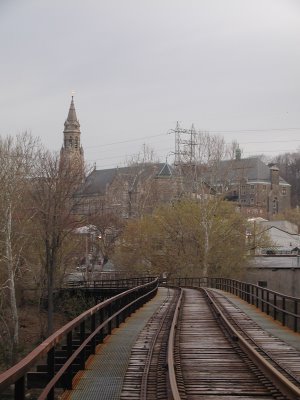 Railroad that runs along Cresson Street towards St. John the Baptist Catholic Church.
Railroad that runs along Cresson Street towards St. John the Baptist Catholic Church. Here at St. John the Baptist Catholic Church, my grandparents William Gallagher and Anna McCaffery were baptized and married. Their first four children William, John, Eugene and Mary were baptized.
Here at St. John the Baptist Catholic Church, my grandparents William Gallagher and Anna McCaffery were baptized and married. Their first four children William, John, Eugene and Mary were baptized. New Condos that have replaced 19th century mills along the canal.
New Condos that have replaced 19th century mills along the canal. A mixture of the old and new along the canal.
A mixture of the old and new along the canal. Manayunk
Manayunk
Thursday, May 18, 2006
Around Town
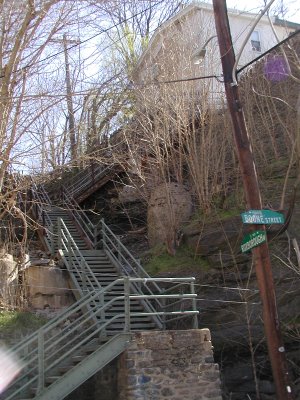 Popular staircases seen throughout the area that take you from the bottom of the steep hills in Manayunk to the top of the steep hills in Roxborough.
Popular staircases seen throughout the area that take you from the bottom of the steep hills in Manayunk to the top of the steep hills in Roxborough.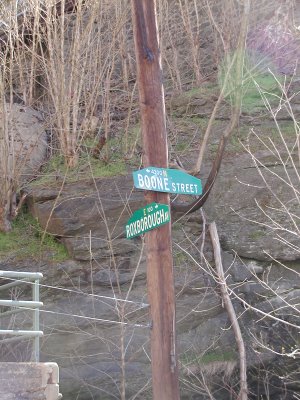 Roxborough Avenue is considered the street that divides Manayunk from Roxborough. In the 19th century, those who lived in Roxborough own the mills whereas those who lived in Manayunk were the mill's workers.
Roxborough Avenue is considered the street that divides Manayunk from Roxborough. In the 19th century, those who lived in Roxborough own the mills whereas those who lived in Manayunk were the mill's workers. St. John the Baptist Parish Churchyard Cemetery. Buried within its walls are John and Sally (Gallagher ) Keller.
St. John the Baptist Parish Churchyard Cemetery. Buried within its walls are John and Sally (Gallagher ) Keller. Railroad track that runs across the Schuylkill River at Shurs Lane and Main Street.
Railroad track that runs across the Schuylkill River at Shurs Lane and Main Street. St. John the Baptist Catholic Grade School. The 2005-2006 school year will be its last. William and Anna (McCaffrey) Gallagher attended school here as did their first three children William, John and Eugene.
St. John the Baptist Catholic Grade School. The 2005-2006 school year will be its last. William and Anna (McCaffrey) Gallagher attended school here as did their first three children William, John and Eugene.
Tuesday, May 16, 2006
Imagination
Monday, May 15, 2006
Jack The Track

I was very fortunate to have grown up with three very special Uncles. There was even a time when I actually had the opportunity to live with them as a child when my Mom moved back home to live with her parents with my brother and I for a short time.
But I have to say that out of all three of these Uncles, my Uncle Jack was my favorite and today we have a very close relationship even though we live across the country from each other. I mean how many Uncles do you know actually call you several times a week to just chat.
So when Uncle Jack calls me and ends up getting my voice mail instead of me, he generally starts out his message with "I love you" and ends it with "give me a jingle". But it seems lately when I return his call, I always end up getting him at the track, the Horse Track. This has happened so much in the last few weeks that I actually asked him if he was having an affair with a horse. His response was typical Uncle Jack, "I am tending to a sick horse". Well, that horse has to be pretty damn sick even close to death for the amount of times he is there. He is there so much that now when he calls he gives me his race track schedule. "If you call me Wednesday thu Sunday in the early part of the day, I will probably be at the track". Then he adds," calling me on Monday and Tuesday is the best".
So now Uncle Jack has developed a Social Schedule for the Race Track .
And I have decided to give him a new name Jack The Track.
Sunday, May 14, 2006
Commemorating Mothers Everywhere
Every year on the second Sunday in the month of May, our country celebrates Mother's Day. It is considered one of the most popular card selling days of the year. It is a time when you cannot walk into a store without feeling the need to buy a card or flower for your Mom.
Years ago when my grandmother was alive, we talked about Mother's Day and what that day meant to her. Her answer surprised me because it was the most selfless answer a mother could give.
Mother's Day was not a day but a life time commitment. So to celebrate motherhood one day a year sounded ridiculous to her. When a woman chooses to bring a baby into this world, she chooses a life time of placing her heart out on the line. She will experience not only the greatest joy of her life, she will also experience the greatest pain of her life. From the time she discovers she is pregnant, her whole world evolves around the tiny life growing within her womb and safely beneath her heart. Everything she does from this point on she questions whether or not it is good for the baby.
In 1914, nine years after Anna Jarvis made a proposal to have a day recognized in honor of her mother's humanitarian efforts, Woodrow Wilson signed a bill and created a national holiday called Mother's Day. It was a day to honor all mothers in all walks of life.
But as my grandmother once told me, Mother's Day was not one day a year but was to be celebrated everyday because once a woman has a child she is a mother for eternity.
And her heart is no longer her own.
Thursday, May 11, 2006
How To Watch T.V. In Three Easy Steps
Wednesday, May 10, 2006
Porcelain God
This past weekend I was blessed with a stomach virus that had the gull to last three days. Statistically speaking, they last on an average of between 24 to 48 hours. Of course, in this case, I could not just be average. Grant it, I was exposed to those nasty little germs several times over the past two weeks. First by my two little grandsons, then from my son, then from my two little grandsons again and finally from Bill. Of course like most close families we like to share and this virus was no exception. But really, after seven days of my last exposure, I should have been sailing in the clear, After all this is what the medical statistics state. Incubation periods last 24 to 60 hours between exposure to illness. But lucky me, when I finally thought I beat the virus, I along with those before me paid homage to the porcelain god. And pay, I did.
Tuesday, May 09, 2006
Family Photos (a.k.a) Big Christmas Gift List
Friday, May 05, 2006
An Artist At Work
Wednesday, May 03, 2006
United 93
I saw the movie tonight and for those of you who are debating over whether or not to see it, I advise you to see it. I sat on the edge of my seat with that horrible stomach nausea only nerves can give you. You will be mad. You will be sad. But you will come away from this movie with a better understanding of what went on that terrible day in our country's history called 9/11.
I remember that day as though it were yesterday. I was working at the hospital and in the patient waiting room was a television. A special report came over the television showing one of the twin towers in New York on fire. At that point, it was still unknown what caused the fire. Many thought it was from a small plane. As I stood watching the report unfold on the news, I watched in horror as a second plane crashed into the second tower. I remember turning around to my coworker Melissa and asking her if she just saw what I thought I saw, a plane crashing into the second tower. She said yes.
Everyone at the hospital gathered around the television and continued watching the news reports unfold. Third plane crashes into the pentagon. Fourth plane crashes into a field in Western Pennslyvania. First tower falls. Second tower falls. The rest of the day became a blur.
The drive home was quiet. There was not a car on the otherwise busy road. The only sound heard was fighter jets as they flew patrol in the sky. Center City Philadelphia was evacuated. Cell phones did not work due to an overload of calls being made.
September 11th, 2001 will always be in the foremost section of my mind.
I remember that day as though it were yesterday. I was working at the hospital and in the patient waiting room was a television. A special report came over the television showing one of the twin towers in New York on fire. At that point, it was still unknown what caused the fire. Many thought it was from a small plane. As I stood watching the report unfold on the news, I watched in horror as a second plane crashed into the second tower. I remember turning around to my coworker Melissa and asking her if she just saw what I thought I saw, a plane crashing into the second tower. She said yes.
Everyone at the hospital gathered around the television and continued watching the news reports unfold. Third plane crashes into the pentagon. Fourth plane crashes into a field in Western Pennslyvania. First tower falls. Second tower falls. The rest of the day became a blur.
The drive home was quiet. There was not a car on the otherwise busy road. The only sound heard was fighter jets as they flew patrol in the sky. Center City Philadelphia was evacuated. Cell phones did not work due to an overload of calls being made.
September 11th, 2001 will always be in the foremost section of my mind.
Tuesday, May 02, 2006
Monday, May 01, 2006
Subscribe to:
Comments (Atom)






